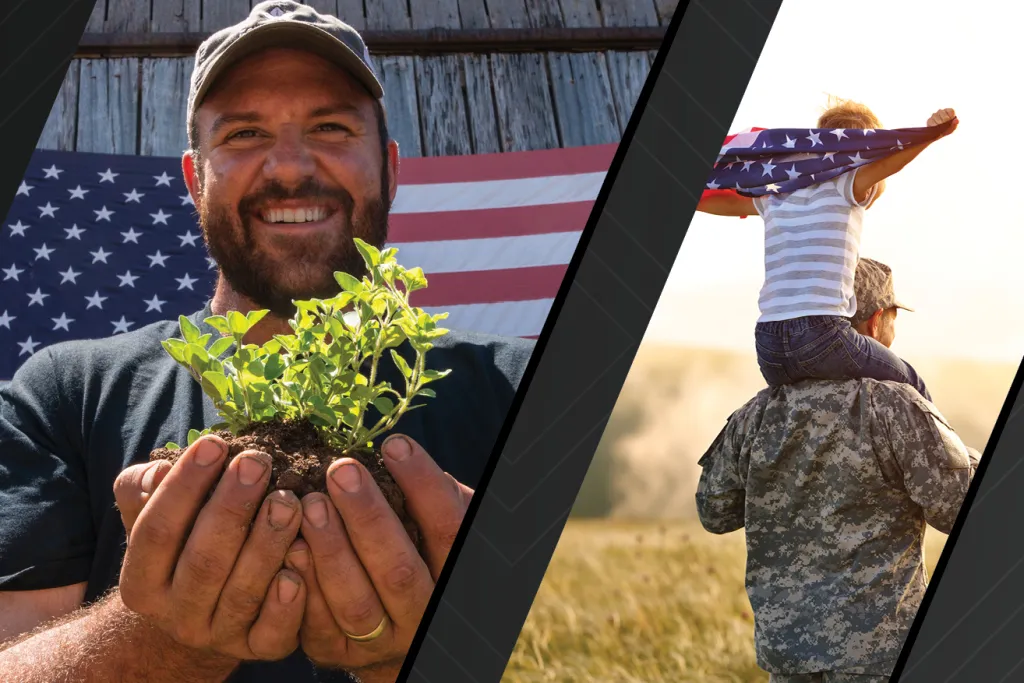USDA’s National Institute of Food and Agriculture (NIFA) has a proud history of supporting military members, Veterans, and military families both in and out of the agency through numerous programs and services.
Military Veterans in Agriculture
“Agriculture is our widest pursuit, because it will in the end contribute most to real wealth, good morals and happiness” – Thomas Jefferson once spoke. Veterans are not new to agriculture. They often come from rural communities and join the military. Once they leave service, some wish to return. A newer trend is veterans who are finding parallels between their military service and farming. Some are finding healing and forming identities through their new service in growing and supplying food and food security.
NIFA continues to invest millions of dollars in programs for U.S. farmers, ranchers, and military veterans continuing or embarking on new careers in farming. NIFA’s Beginning Farmer and Rancher Development Program (BFRDP) funds projects that provide education and skill building for new farmers and ranchers. This program invests no less than 5% of its funds to Veteran programs. One example is the NC Veterans Farm, a veteran organization started by a former Marine, Robert Elliott, who served and then found healing in farming. His 50-acre educational farm is now home to veterans who want to learn how to be successful in today’s farming markets.
The Enhancing Agricultural Opportunities for Military Veterans (AgVets) program is managed by nonprofit veteran groups. It offers onsite, hands-on training (including immersive model farm and ranch programs) plus classroom education to create pathways for military veterans interested in agriculture careers. One AgVets program is Arcadia, located just outside of the Washington, D.C. area. Arcadia provides classroom training, hands-on farming and gives back to local communities.
Support for Disabled Veterans
AgrAbility is a NIFA-funded program for dis(abled) farmers. The program helps farmers, especially military veterans, stay in farming in a safe and productive way. Veterans do not need to have an established farm. If you are a military veteran, AgrAbility assists you in finding what you would like to farm and connecting with networks to assist in finding available land. Davon Goodwin is an Army veteran grape producer who suffered injuries that led to epilepsy attacks. He approached AgrAbility to help him find ways to alert himself and others when he is having a seizure. Today, he continues to work with AgrAbility to create new technologies to keep him safe while increasing his farm’s productivity.
Networking
This November, NIFA staff will once again join other USDA colleagues for the 2022 Annual Farmer Veteran Stakeholders Conference, November 13 - 15 in Oklahoma. The conference offers the largest gathering of the military and agricultural communities in the country. This year, for the second time, one of our very own, Dr. Crystal Kyle has been asked to share her expertise, research, NIFA experience, and personal experience as a veteran and a farmer.
NIFA Veteran Emphasis Group
NIFA’s Veteran Emphasis Group continues to grow. This group is made up of veterans, their families, and veteran advocates who work together to advocate for veterans’ celebrations and for resources within and outside the agency. This year the group collaborated with many USDA and government-wide groups, spoke at agricultural events, attended Veteran Affairs meetings, and placed a wreath at the Tomb of the Unknown Soldier on Memorial Day.
NIFA is proud to support Veterans every day. Veterans: Thank you for your courage, strength, and dedication to keeping us safe.
NIFA invests in and advances innovative and transformative research, education and extension to solve societal challenges and ensure the long-term viability of agriculture.

